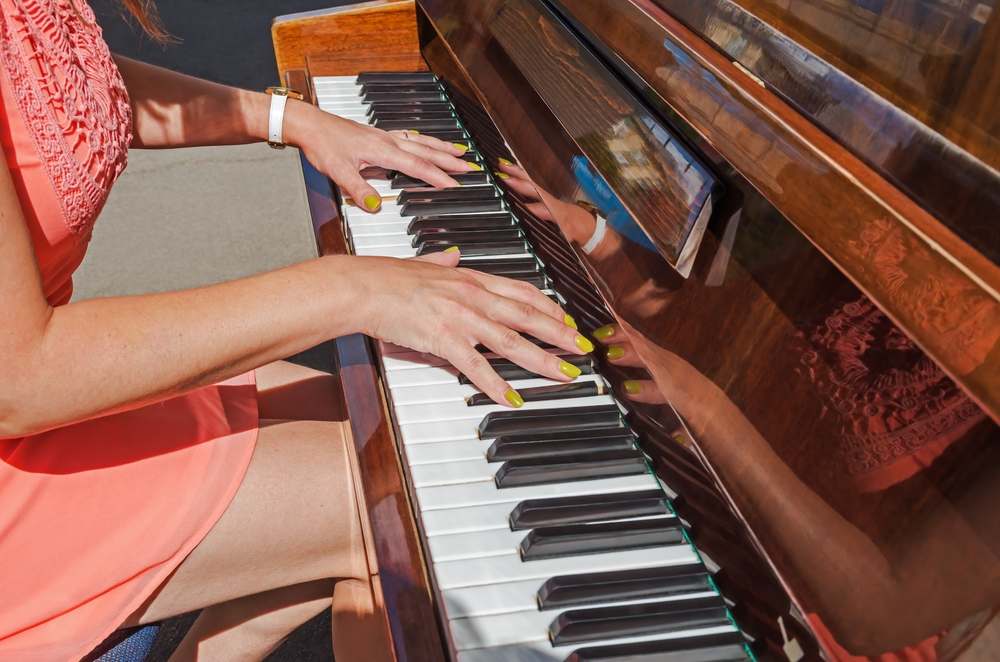
Introducing your child to the world of piano playing and piano lessons is an enriching experience that has numerous cognitive and emotional benefits. However, for your child to truly thrive in this art form, it’s crucial to maintain a consistent practice schedule.
On average, professional pianists might practice anywhere from 2 to 8 hours a day, depending on their immediate goals and performances. For children, the amount of time spent on the piano will obviously be much less, but consistency and focus is key.
How Often Should You Practice Piano?
The frequency and duration of your piano practice sessions largely depend on what level of proficiency you aspire to achieve. Practice isn’t a one-size-fits-all activity; from casual learners to aspiring concert pianists, the commitment varies. Factors influencing practice duration include age, skill level, and personal objectives. Here’s a general guide:
- Beginners (Children): 15-20 minutes daily.
- Beginners (Adults): 20-30 minutes daily.
- Intermediate Players: 45-90 minutes daily.
- Advanced Players: 2-4 hours daily.
- Professional or Aspiring Concert Pianists: 4-8 hours daily.
Regardless of age or skill level, it’s essential to understand that sometimes, shorter, focused practice sessions can be more impactful than prolonged ones. The key lies in concentrated, quality practice rather than just clocking hours.
Tips for Effective Practice Sessions
For many aspiring pianists, efficient practice is the key to rapid progression. Let’s explore how you can maximize your time at the keys.
Embrace Quality Over Quantity: It’s not about how long you practice, but how well you do. Focused, deliberate practice often trumps hours of aimless playing. By honing in on your weaknesses and being attentive during practice, you’ll see more significant improvement.
Create a Dedicated Practice Space: Your environment matters. By setting up a specific spot for piano practice, free from distractions and equipped with everything you need, you condition your mind to switch into “practice mode” every time you sit down. This designated space can help enhance concentration and focus.
Segment Your Practice Time: Consider breaking your practice sessions into shorter, focused intervals. This approach can help maintain high levels of concentration and prevent fatigue. For instance, instead of an hour-long session, try four 15-minute focused intervals with short breaks in between.
Set Clear Goals: Aimless practice can lead to stagnation. Before each session, set specific goals, be it mastering a new scale, ironing out a tricky section of a piece, or perfecting finger movements. Knowing your objective keeps you motivated and offers a clear direction.
Use practice techniques: Ever heard of the 4-3-2-1 technique? Identify the tricky transition and pause there. Count down from “4” at the song’s tempo, then continue. This gives you a moment to prepare for the next section. Repeat, reducing the countdown by one each time. Eventually, you’ll play without pausing, achieving a smoother transition.
How To Handle Resistance to Piano Practice
It’s not uncommon for children, and even adults, to occasionally resist practicing the piano. Some of the most frequent culprits behind this reluctance include feelings of frustration or plain old boredom. Overcoming these barriers is essential for sustained learning.
Frustration often stems from a feeling of being stuck or not making visible progress. To counter this, it’s important to set clear, achievable goals for every practice session. For example, instead of targeting an entire piece, focus on mastering a particular section or even just a few bars.
Boredom, on the other hand, can arise from monotony. Changing up routines can bring a refreshing twist. Introducing new pieces of music, integrating fun piano activities, or even just altering the sequence of practice can reignite interest. Additionally, there’s a plethora of piano books and apps designed to make learning engaging. Incorporating these into the curriculum can transform practice from a chore to a delight.
Lastly, never underestimate the impact of external guidance. A skilled piano teacher can offer a fresh perspective, introduce new techniques, or simply motivate a student through a rough patch.
Is it Good To Practice Piano Every Day?
Practicing the piano daily can significantly improve a player’s proficiency. Regular touchpoints with the instrument ensure that skills remain fresh and techniques become ingrained. However, like any other activity, it’s essential to strike a balance.
Taking regular breaks during practice sessions can greatly enhance productivity. Just as athletes need rest days to recover and grow stronger, pianists can benefit from occasional breaks. These breaks can prevent both mental burnout and physical strain on the fingers and hands.
Allowing the mind and fingers a day off can sometimes be the refreshment needed to return with renewed vigor and a fresh perspective. It’s during these rest periods that our brains often process and consolidate what we’ve learned, making our next practice even more productive.
Understanding the Role of Parents & Teachers in Encouraging Practice
Behind every budding pianist, there’s often a network of support that plays an indispensable role in their journey. Parents and teachers form the pillars of this support system.
Parents provide the foundational encouragement. Their role goes beyond ensuring regular practice. Celebrating small victories, providing a conducive environment for practice, and sometimes just being a patient listener can inspire a child to persevere.
Teachers, on the other hand, bring technical expertise and structured guidance. Their feedback, both positive and constructive, can shape a student’s approach and technique. Moreover, a teacher’s ability to gauge a student’s strengths, weaknesses, and interests allows them to tailor lessons for optimal learning.
Enrich Your Child’s Journey with Music Therapy for Kids
As we’ve journeyed through the intricacies of piano practice, one principle stands out: the need for a tailored approach. Piano practice isn’t a one-size-fits-all endeavor. Factors like age, skill level, personal goals, and even daily moods can influence the ideal practice duration and routine. Establishing a practice routine that accounts for these factors is vital for sustained and enjoyable learning.
This is where Lessons in Your Home shines as a beacon for aspiring pianists.
Lessons in Your Home offers a tailored approach to music lessons, deeply considering the student’s individual requirements. Whether you’re seeking in-person guidance in the comfort of your home or prefer the flexibility of virtual lessons, LIYH ensures a seamless learning experience. Beyond piano, their repertoire extends to a myriad of music lessons, encompassing vocal training, violin, and much more. With their holistic approach, LIYH is truly the optimal choice for anyone on a musical quest.
Ready to embark on your musical journey with confidence? Contact us today to learn more about our personalized music lessons and how we can assist you in realizing your musical aspirations.
